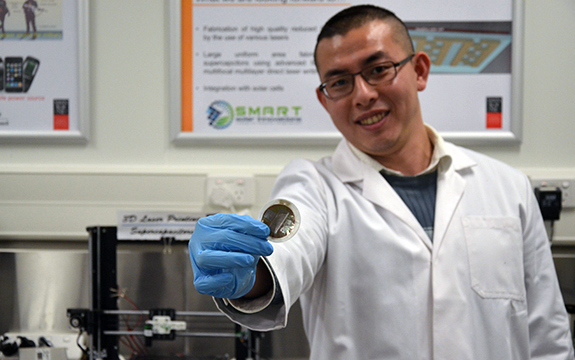Superfast charging, everlasting batteries

In Summary
- Swinburne researchers have developed a new type of battery
- It can be charged in seconds, used millions of times and is eco-friendly
At Swinburne, researchers have developed a new type of battery – a supercapacitor that charges extremely fast.
Batteries are essential in modern society, however, they have three main disadvantages:
- They take ages to charge
- They have a limited life
- They’re harmful for the environment and require special disposal processes
In addition, they may explode if they are defective or improperly handled.
The new supercapacitor can be charged in seconds, used millions of times, and is environmentally friendly.
It is also safer than ordinary batteries when mistreated and will not explode under any circumstances.
“Previously, a major problem with supercapacitors has been their low capacity to store energy,” says researcher Dr Han Lin.
“Now we have overcome this problem by making these supercapacitors from graphene, a material that has a very large surface area available to store energy.
“Our supercapacitor is extremely efficient, as it charges in a matter of seconds and holds a larger charge for a longer time because it consists of multiple sheets of graphene – creating a very large surface area on which to store energy.
“What’s more, charging and discharging won’t degrade the battery’s quality, so it can theoretically last for a lifetime – a unique property in the world of batteries.”
Large-scale production possible
Dr Lin says large-scale production of the graphene that would be needed to produce these high-performance supercapacitors was once unachievable.
By using low-cost solution-based film synthesis techniques and a laser 3D printer, the researchers are able to produce graphene on a large scale at low cost.
In addition, the supercapacitors are very strong and flexible, and can therefore also be used to develop extremely flexible and thin batteries that could be built into wearable clothing and other personal accessories.
The research has been funded by an Australian Research Council Discovery Project grant.
Dr Lin presented the new supercapacitor at Fresh Science Victoria 2016 earlier this year.

